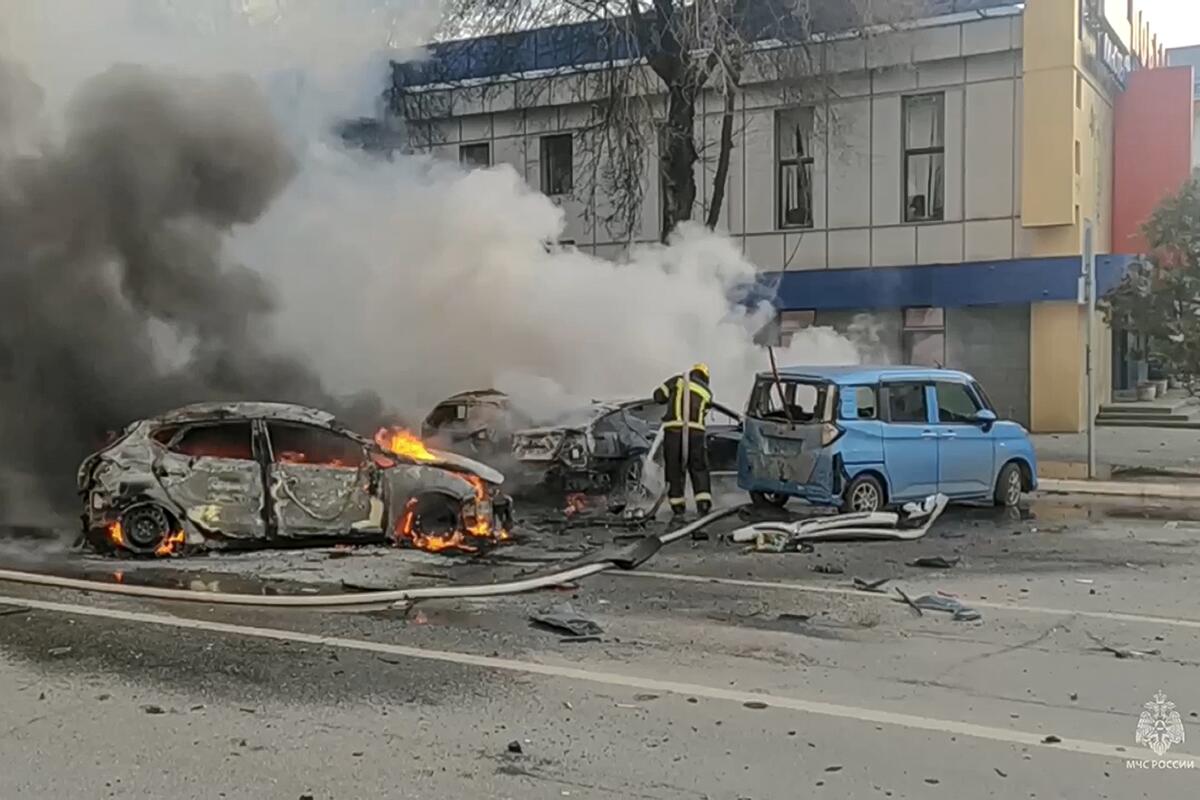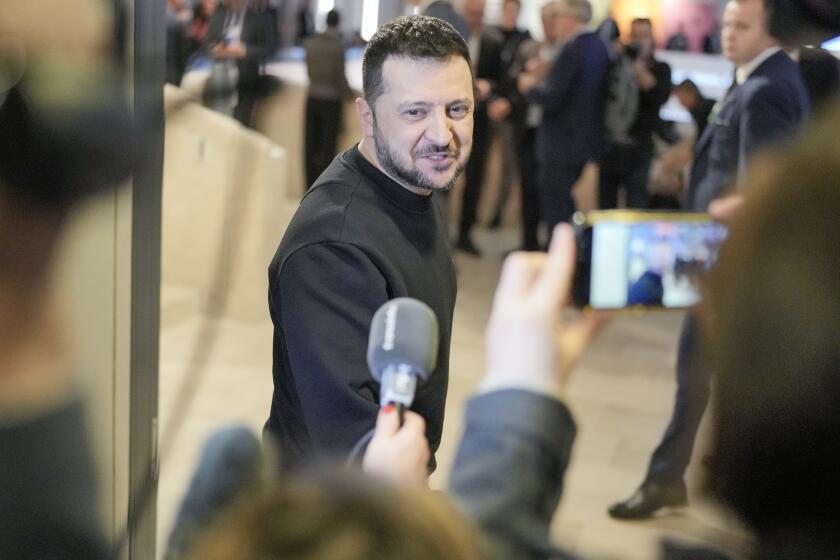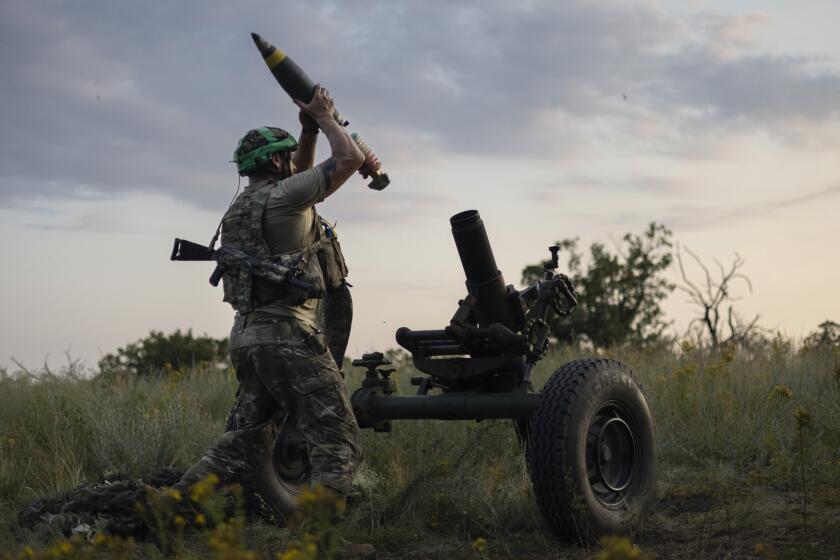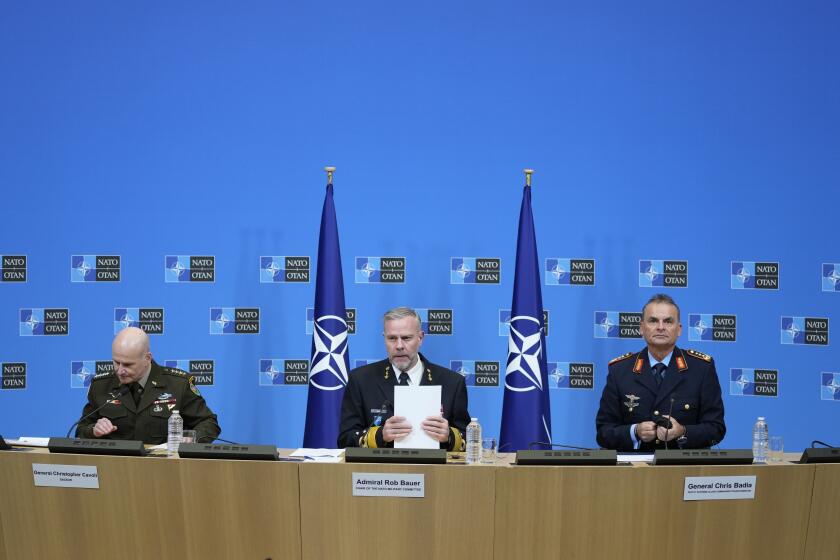Ukraine’s strikes inside Russia hurt Putin’s efforts to show the war isn’t hitting home

- Share via
The wail of air-raid sirens is commonplace in Belgorod, a Russian border city whose residents are on edge following a Ukrainian missile attack over a New Year’s holiday weekend that left dozens of people dead and injured.
A spectacular explosion from a Ukrainian drone rocked a huge fuel export terminal on the Baltic Sea southwest of St. Petersburg earlier this month, forcing the energy company Novatek to suspend operations for several days.
Last week, an apparent drone attack on the Black Sea port of Tuapse in the southern Krasnodar region hit one of Russia’s largest refineries and ignited a fire, while another big refinery in the Volga River city of Yaroslavl, north of Moscow, came under attack early Monday, but officials said there was no damage.
There also have been strikes on a gunpowder factory in the Tambov region and arms producers and military facilities in the Bryansk, Smolensk and Tula regions of Russia.
Attacks such as these are dealing a heavy blow to President Vladimir Putin’s attempts to reassure Russians that life in the country remains largely untouched by its nearly 2-year-old war against its neighbor.
“Ukraine has increased its capacity to strike back against Russia,” Michael Kofman, a military expert with the Carnegie Endowment, said in a recent podcast. “You see increased Ukrainian attacks against Russian critical infrastructure, retaliatory attacks against cities like Belgorod and greater strikes against Russian military base in Crimea.”
Many Ukrainians whose relatives are imprisoned in Russia fear that a plane crash earlier this week could herald the end of prisoner exchanges.
As Putin ramps up his presidential campaign ahead of the election in March, he wants to maintain an air of normality. But the increasingly frequent Ukrainian attacks have raised the visibility of the war on Russian soil, and there are other signs that the conflict is increasingly challenging the Kremlin’s tight control of the political scene.
Thousands across Russia have signed petitions supporting the long-shot presidential bid of liberal politician Boris Nadezhdin, who has made ending the war his main campaign issue. Wives of some soldiers rounded up in a partial mobilization in 2022 have pushed for their discharge. And despite a tight ban on protests, hundreds rallied in Bashkortostan province, clashing with police to protest the jailing of a local activist.
Certainly, the Dec. 30 strike on Belgorod marked a bloody escalation in the minds of many Russians. A barrage of missiles struck the city of 340,000, which is about 25 miles east of the Ukrainian border, on a holiday weekend when people were out shopping, ice skating and watching New Year’s festivities. Officials said 25 people were killed, including five children, and more than 100 were injured.
Residents described seeing victims with horrific injuries and pools of blood staining the sidewalks. One resident told the RBC news outlet that he saw a baby carriage hit by shrapnel, the bloodied parents lying next to it. A drug store clerk said injured pedestrians ran into his pharmacy seeking help.
Thousands of people across Russia are signing petitions to support the longshot candidacy of Boris Nadezhdin.
“I’m seeing requests on social networks from people who write: ‘We are scared, please help us get to a safe place!’” said regional Gov. Vyacheslav Gladkov, adding that several hundred people were evacuated, including more than 1,000 children heading to camps in neighboring regions.
Holiday and religious festivities were muted or canceled entirely.
The shelling damaged nearly 600 apartments and scores of private homes, and shrapnel peppered more than 500 cars. Bus stops are being reinforced with concrete blocks and sandbags.
Residents say they flinch at any loud noise these days and are afraid to go outside. Schools in the city and near the border have switched to online classes until mid-February.
Ukrainian President Volodymyr Zelensky says he’s worried at the prospect of Donald Trump returning to the White House.
It’s not the first time Belgorod has been touched by the war, with drone strikes and other attacks early in the conflict. In April 2023, a bomb accidentally released by a Russian warplane exploded in a street, gouging a huge crater and injuring two people.
On Wednesday, the Defense Ministry said a military transport plane was shot down in the Belgorod region while carrying Ukrainian prisoners of war, killing all 74 people aboard. Although Russia has released what it called evidence that it said proved Ukrainian POWs were aboard, officials in Kyiv disputed it and instead blamed Moscow for trying to use the incident to hurt Ukrainian morale.
Putin said the Dec. 30 shelling of Belgorod left him “boiling with anger,” describing it as an act of desperation by Kyiv following the failure of Ukraine’s counteroffensive.
“They want to show their people and their sponsors who give them money, weapons and ammunition that they can retaliate against Russia’s action,” he said. “They want to show that they can also do something, but instead of fulfilling military tasks, they use barbaric methods and strike peaceful settlements with indiscriminate weapons.”
Ukraine’s security service says arms firm employees conspired with defense ministry officials to embezzle money earmarked to buy mortar shells.
Throughout the war, the Kremlin has claimed that Russia has hit only military targets in Ukraine, despite widespread evidence to the contrary and heavy civilian casualties in places such as Kyiv, Mariupol and Kharkiv.
Ukrainian officials rarely comment on strikes inside Russia, but they emphasize their right to use all means to counter Moscow’s aggression.
At a news conference in August, Ukrainian President Volodymyr Zelensky said Russia had launched more than 6,500 missiles and 3,500 drones since the war began, most of them at civilian targets. In a New Year’s address to the nation, he vowed: “The one who brings hell to our land will one day see it from their own window.”
Russian hawks have pointed to Belgorod as a turning point for the Kremlin to raise the stakes in the war.
Start your day right
Sign up for Essential California for the L.A. Times biggest news, features and recommendations in your inbox six days a week.
You may occasionally receive promotional content from the Los Angeles Times.
Alexander Dugin, a nationalist ideologue whose daughter was killed in a car bombing blamed on Ukraine in August 2022, argues that Russia should respond by escalating the fighting and declaring a broad mobilization.
“I would like to believe that Russia now will take off the white gloves and start fighting for real,” he wrote. “Should we abide by the rules at a time when a gateway to hell opens? Our task for 2024 is to restructure the state and society to put it on military footing and throw all our resources to achieve victory.”
Russian military bloggers note the challenges of spotting Ukrainian rocket launchers moving to positions less than 25 miles from the border, emphasizing the need for better surveillance. Many lamented Russia’s withdrawal from the area in September 2022 amid Kyiv’s swift counteroffensive, arguing that more Ukrainian territory should be captured to secure Belgorod and other border regions.
With fighting largely frozen along the 930-mile front line during winter, Ukraine’s missile and drone attacks on targets inside Russia have demonstrated a long-range strike capability that is stretching Moscow’s security assets.
NATO next week will launch its biggest war games in decades, with about 90,000 personnel set to take part in months-long military exercises.
“Continued Ukrainian strikes in deep rear areas in Russia may thus increase pressure on Russia’s air defenses overall,” the Washington-based Institute for the Study of War said in a recent analysis.
If this is Kyiv’s plan, it’s similar to what Russia itself did a year ago by targeting Ukraine’s power grid in the hope that repairs would take time. In the end, Ukraine managed to get enough spare parts and make quick fixes so that Moscow’s campaign failed. Now, it’s Russia that needs to find a coping strategy.
Sergey Vakulenko, an energy analyst at the Carnegie Russia Eurasia Center, said it could be challenging for Russian refineries to fix the damage quickly.
While Ukraine’s small drones can’t cause major destruction, he said “they can damage not just pipelines but also compressors, valves, control units and other pieces of equipment that are tricky to replace because of sanctions.
“If we are seeing the beginning of a wave of attacks on western Russia’s oil refineries, the consequences will be serious,” Vakulenko said in a commentary.
More to Read
Sign up for Essential California
The most important California stories and recommendations in your inbox every morning.
You may occasionally receive promotional content from the Los Angeles Times.















